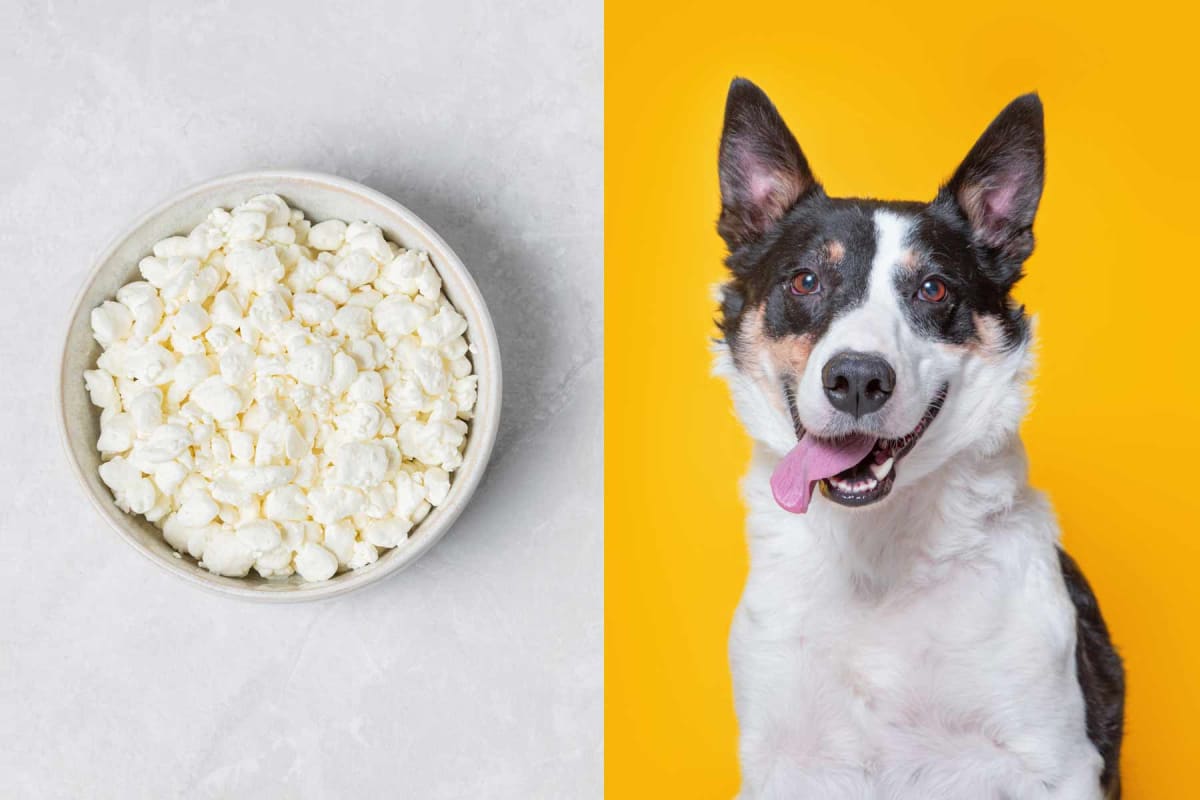
Can dogs eat cottage cheese?
Can dogs eat cottage cheese?
Can dogs have cottage cheese?
If you've ever been enjoying a spoonful of cottage cheese and noticed your furry friend giving you those irresistible puppy dog eyes, you might wonder: can dogs eat cottage cheese? The good news is yes, dogs can have cottage cheese, it can even be a healthy treat for your canine companion.
Let's dive into everything you need to know about sharing this dairy product with your dog.
Is cottage cheese good for dogs?
Cottage cheese offers several nutritional benefits for dogs:
High in protein, which helps build and maintain muscle mass
Contains calcium for bone health, along with other essential nutrients like phosphorus, selenium, and B vitamins
Has probiotics (in some varieties) to support digestive health by promoting beneficial gut bacteria.
Relatively low in fat and calories compared to many other cheeses, making it a healthier option for treats
For active dogs or those needing to build muscle, cottage cheese can be particularly beneficial due to its high-quality protein content. It's also gentle on the stomach when served plain, without added salt, herbs, or flavorings.
Is cottage cheese good for dogs with diarrhea?
Cottage cheese is often recommended as part of a bland diet for dogs suffering from mild digestive issues, including diarrhea. The mild nature of cottage cheese, combined with its probiotic properties, can help soothe an upset stomach and promote normal bowel function.
Veterinarians sometimes suggest a temporary diet of plain white rice and cottage cheese for dogs recovering from gastrointestinal upset. This combination provides easily digestible nutrition while giving the digestive system time to recover.
If your dog is experiencing severe or prolonged diarrhea, always consult with your veterinarian before attempting home remedies. Persistent digestive issues can indicate more serious health conditions that require professional treatment.
When is cottage cheese bad for dogs?
While cottage cheese can be beneficial for many dogs, there are situations when you should avoid it:
Extra ingredients: Cottage cheese with added ingredients like onions, garlic, or artificial sweeteners (especially xylitol) are dangerous for dogs. These additives can be toxic to canines and should never be fed to them.
Allergies & sensitivities: Dogs with diagnosed lactose intolerance or dairy allergies should not eat cottage cheese, as it can cause uncomfortable symptoms like gas, bloating, diarrhea, or vomiting.
Antibiotics: If your dog is on a tetracycline class of antibiotics, the calcium in cottage cheese may interfere with absorption and reduce the medication's effectiveness.
Health conditions: Dogs with certain health conditions, such as pancreatitis or kidney disease, may need to avoid cottage cheese due to its fat or mineral content. Always check with your veterinarian before introducing cottage cheese if your dog has any existing health concerns.
Additionally, cottage cheese with high sodium content can be problematic, especially for dogs with heart conditions or high blood pressure. Look for low-sodium options when possible.
How to feed your dog cottage cheese
When introducing cottage cheese to your dog's diet, choose plain, low-fat varieties. Avoid cottage cheese with added flavorings, herbs, fruits, or high sodium content, as these extras can be harmful to dogs.
You can serve cottage cheese in several ways:
Mix a small amount into your dog's regular food.
Use it to disguise medications.
Freeze it in a Kong toy for a cooling summer treat.
Offer a spoonful as an occasional reward.
Always ensure the cottage cheese is fresh and properly refrigerated before serving it to your pet. Spoiled dairy products can cause serious digestive upset in dogs.
How much cottage cheese can a dog have?
Treats, including cottage cheese, should be fed in moderation and make up no more than 10% of your dog's daily caloric intake. For most dogs, this means limiting cottage cheese to 1 to 2 tablespoons for small dogs, 2 to 3 tablespoons for medium-sized dogs, and up to ¼ cup for large breeds.
Factors that influence how much cottage cheese is appropriate include:
Your dog's size and weight
Their overall health and activity level
Any existing dietary restrictions or allergies
Whether they've shown sensitivity to dairy in the past
If you're unsure about the right amount for your dog, consult with your veterinarian for personalized guidance based on your pet's individual needs.
Safe alternatives to cottage cheese for dogs
If your dog is lactose intolerant or simply doesn't care for cottage cheese, there are many non-dairy foods dogs can eat as an occasional treat, including:
Protein sources: Plain cooked chicken, turkey, or lean beef can be excellent protein sources for dogs. Just make sure they're unseasoned, boneless, skinless, and fully cooked.
Vegetables: Many dogs enjoy carrots, green beans, peas, and sweet potatoes (cooked and plain). These vegetables provide valuable nutrients and fiber.
Fruits: Apples (without seeds), blueberries, and watermelon (without seeds) make great low-calorie treats packed with vitamins and antioxidants.
Remember to introduce any new foods gradually while monitoring for any adverse reactions. What works for one dog may not work for another, so always pay attention to your pet's individual response. When in doubt, consult your veterinarian for personalized guidance.